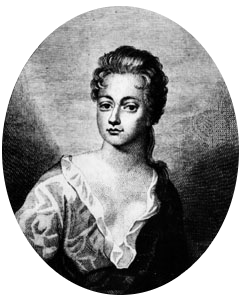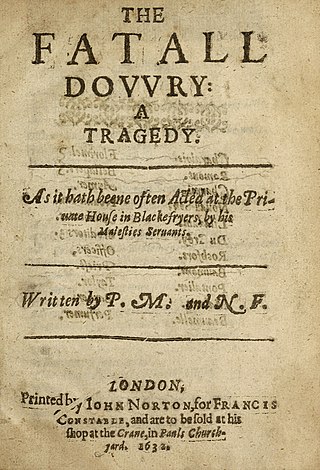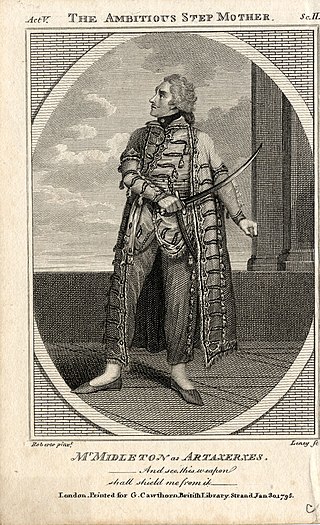
Sir Michael Caine is an English retired actor. Known for his distinctive Cockney accent, he has appeared in more than 160 films over a career that spanned eight decades and is considered a British film icon. He has received numerous awards including two Academy Awards, a BAFTA Award, three Golden Globe Awards, and a Screen Actors Guild Award. As of 2017, the films in which Caine has appeared have grossed over $7.8 billion worldwide. Caine is one of only five male actors to be nominated for an Academy Award for acting in five different decades. In 2000, he received a BAFTA Fellowship and was knighted by Queen Elizabeth II.
This article contains information about the literary events and publications of 1715.

Nicholas Rowe was an English dramatist, poet and miscellaneous writer who was appointed Poet Laureate in 1715. His plays and poems were well-received during his lifetime, with one of his translations described as one of the greatest productions in English poetry. He was also considered the first editor of the works of William Shakespeare.

Susanna Centlivre, born Susanna Freeman, and also known professionally as Susanna Carroll, was an English poet, actress, and "the most successful female playwright of the eighteenth century". Centlivre's "pieces continued to be acted after the theatre managers had forgotten most of her contemporaries." During a long career at the Theatre Royal, Drury Lane, she became known as the second woman of the English stage, after Aphra Behn.
Barton Booth was one of the most famous dramatic actors of the first part of the 18th century.

Anne Bracegirdle was an English actress.

The Fatal Dowry is a late Jacobean era stage play, a tragedy written by Philip Massinger and Nathan Field, and first published in 1632. It represents a significant aspect of Field's very limited dramatic output.
The Fair Penitent is Nicholas Rowe's stage adaptation of the tragedy The Fatal Dowry, the Philip Massinger and Nathan Field collaboration first published in 1632. Rowe's adaptation, premiered onstage in 1702 and first published in 1703, was a great popular success through much of the 18th century, and was praised by critics as demanding as Samuel Johnson.
The Biter is a 1704 play by the English writer Nicholas Rowe. Rowe was better known for his tragedies but chose to try his hand at comedy. Performed at the Lincoln's Inn Fields Theatre, it was not a great success and lasted for about six performances. It was overshadowed by the more popular The Careless Husband by Colley Cibber, which appeared at the Drury Lane Theatre. It was Rowe's only play in a contemporary setting, and he rapidly turned back to historical tragedies beginning with Ulysses (1705). Some sources reported Rowe defiantly and loudly laughing at the jokes during a performance, even while nobody else did.

The Tragedy of Lady Jane Grey, often shortened to Lady Jane Grey, is a 1715 tragedy by the British writer Nicholas Rowe. It portrays the brief reign of Lady Jane Grey, a pretender to the English throne following the death of Edward VI and her defeat and execution by Mary I in 1554. The title role was played by the prominent actress Anne Oldfield. The cast also included John Mills as the Duke of Northumberland, Barton Booth as Lord Guilford Dudley and Lacy Ryan as the Earl of Sussex, Colley Cibber as Bishop Gardiner, James Quin as the Lieutenant of the Tower and Mary Porter as the Duchess of Suffolk.

The Ambitious Stepmother is a 1700 tragedy by the British writer Nicholas Rowe. It was his debut play. Rowe set his play in Biblical times, but it had strong subtexts of the contemporary questions about the British succession that led to the Act of Settlement in 1701. At the court of Persia, Amestris schemes against her stepson Artaxerses.
Ulysses is a 1705 tragedy by the British writer Nicholas Rowe. Rowe turned back to writing tragedies following his unsuccessful comedy The Biter of the previous year. The cast included Thomas Betterton as Ulysses, Barton Booth as Telemachus, Elizabeth Barry as Penelope and Anne Bracegirdle as Semanthe. Many of the actors also appeared in Rowe's following work The Royal Convert.
The What D'Ye Call It is a 1715 farce by the British writer John Gay. It was written as a parody of tragic plays, with particular reference to Thomas Otway's Venice Preserv'd.
The Captives is a 1724 tragedy by the British writer John Gay. The action takes place in the ancient Median Empire, following the fashion in many tragedies of the era to have oriental settings. It concerns a plot against the King, which involves his wife and two royal Persian captives.
The Invader of His Country, or The Fatal Resentment is a 1719 tragedy by the British writer John Dennis. It is based on Coriolanus by William Shakespeare, portraying the life of the Roman general Gaius Marcius Coriolanus. Written in the wake of the 1715 Jacobite Rebellion, it was intended by the Whig Dennis as a patriotic defence of the Hanoverian Succession by drawing parallels with Coriolanus's shift from loyal commander to rebel leader to the contemporary situation.

The Spartan Dame is a 1719 tragedy by the Irish writer Thomas Southerne. It was inspired by a story from Plutarch's Life of Aegis and was originally written as early 1687, but faced a long period of censorship and revision. The Drury Lane managers chose to revive it at a time of tension with the Stanhope-led government Whigs over licensing issues, and may have selected it because its plot subtly allowed them to demonstrate sympathy with the opposition Whigs led by Robert Walpole following the recent Whig Split.
The Generous Conqueror is a 1701 tragedy by the English writer Bevil Higgons. It was published in January the following year, and is sometimes dated 1702 by this. Higgons was a well-known Jacobite who had been implicated in the 1696 Jacobite assassination plot against William III. In this play he effectively called for the peaceful succession of the pretender to the throne as James III.
George Pack was a British stage actor, singer and theatre manager of the eighteenth century. His first known performance on the London stage was as Westmoreland in Shakespeare's Henry IV at the Lincoln's Inn Fields Theatre and he remained with the company until it transferred to the Queens's Theatre in the Haymarket in 1705. He played in a mixture of comedies and tragedies, originating roles in plays by many of the leading dramatists of the era including Nicholas Rowe, Mary Pix, John Vanbrugh and Susanna Centlivre.
Tamerlane is a 1701 history play by the English writer Nicholas Rowe. A tragedy, it portrays the life of the Timur, the fourteenth century conqueror and founder of the Timurid Empire. Rowe, a staunch Whig, used the historical story as an allegory for the life of William III who resembles his portrayal of Tamerlane while his opponent the Ottoman leader Bayezid I was equivalent to William's longstanding opponent Louis XIV of France. An earlier version of the story Tamburlaine was written by Christopher Marlowe during the Elizabethan era with a very different focus in the context of the English Renaissance.

The Tragedy of Jane Shore is a 1714 historical tragedy by the British writer Nicholas Rowe. It was his penultimate play, and was inspired by the life of Jane Shore the mistress of Edward IV.










